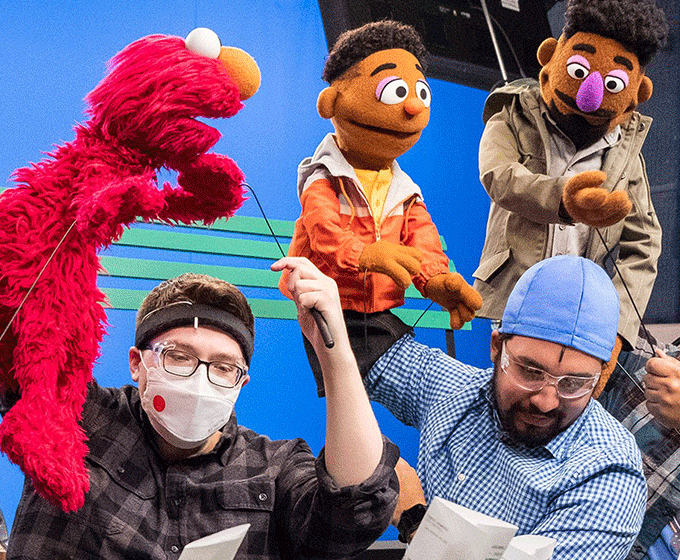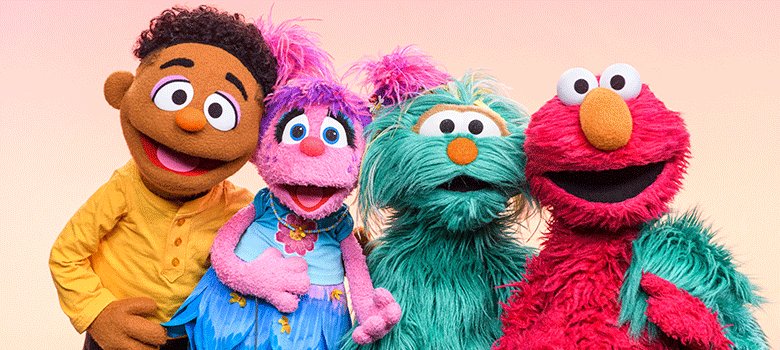
Bradley Freeman Jr. (right) is the puppeteer behind Wesley Walker, one of the newest additions to "Sesame Street." Photo: Zach Hyman | Sesame Workshop
MAY 11, 2021 — Bradley Freeman Jr. sees a lot of sunny days ahead. And like the famous children’s show theme song says: He’s on his way to where the air is sweet—because he’s already found his way to Sesame Street.
The senior communication major is set to graduate this month and already the biggest of his dreams is being realized. Two months ago, he began working with Sesame Workshop and its new initiative, the “ABCs of Racial Literacy” as part of Coming Together, the workshop’s ongoing commitment to racial justice. The Coming Together initiative includes a “racial justice educational framework” meant to help parents engage with their children on the topic of race, and includes tools and research to help build racial literacy.

Freeman's character Wesley Walker (far left) helps parents engage with children on racial topics. Photo: Zach Hyman | Sesame Workshop
Bradley has been studying and teaching himself puppetry for most of his life, enamored first with Barney, the purple dinosaur, then the hybrid model of “Blue’s Clues,” and later Muppets like Elmo and Kermit. His grandparents gave him the first season of “The Muppet Show,” a four-DVD set that at the time cost $40.
“I had an Elmo birthday party and I loved Elmo. I still do,” Bradley said. “There’s something special about meeting Kermit—you know you can go up to him and shake his hand and have a conversation. I think that magic is really there with Big Bird. He exists and he can walk around with you. I get to work with him tomorrow which is insanity.”
Bradley funneled his love into practice, hooking up a video camera to a television and practicing the expressiveness of puppetry while playing with movement and scale. He became a puppeteer at age 5, and by 10 he knew he wanted to pursue puppetry for his career.
“I’ve been training myself since I was 10,” he said.
In 2018 he applied to participate in a Sesame Workshop international puppetry workshop. He was one of 30 selected out of hundreds of applicants. He spent three days in New York City, training and networking with his childhood heroes while they scouted out potential talent for the future.
In late 2020, Bradley sought feedback on his demo reel showcasing his puppetry skills from his childhood hero, Martin Robinson, the actor and puppeteer behind Telly Monster and Mr. Snuffleupagus. Robinson loved the reel and shared it with Matt Vogel, the voice of Kermit and also Big Bird.
Bradley was then asked to audition for the role of a new Muppet, 5-year-old Wesley Walker. Wes and his father Elijah (also known as Eli the Weather Guy) are both Black, and through father-son conversations they explore race, modeling for viewers how to discuss tough topics such as appreciating the differences in people, melanin and skin color, and racism.
“I was like Donald Duck smelling a pie—like my legs were just floating on air,” Bradley said motioning with his fingers to indicate walking on air after hearing the invitation. “I thought at the time, man, when I don’t get this, this is going to be such a great story to tell.”
The story got even better when he got the job.
“I remember reading for Wes and connecting with him immediately,” recalled Bradley, who is Afro-Latino and grew up in a multigenerational household that included his mom, his now 12-year-old brother and his grandparents in Brownsville. “Wes is everything I wanted to be as a kid. I was very shy as a kid and quiet, but he’s able to talk to anyone.”
Wes’s father, Elijah, reminds Bradley of his own grandfather—someone who was always there for him. “Sesame Street” has never been afraid to push boundaries, he said, and beginning discussions about race with children at a young age is the right time to do it.
“The best way to not be racist is to be anti-racist,” Bradley said. “It’s not about being silent. We have to teach kids about the problem and we have to teach them the solution so they can practice it.”
With graduation on the horizon, Bradley is juggling a lot between monthly trips to New York City to film the show, his virtual studies during a pandemic, and working his second job as a performer at the San Antonio River Walk mainstay Howl at the Moon, a place known for its dueling piano players.
Bradley said he’s enjoyed his time at UTSA where he feels like he got the “real” college experience he wanted after spending two years in community college where he also worked a 9-to-5 job.
“I had a couple of really great professors. They weren’t really instrumental in puppeteering, but they were reassuring and caring, and they cared about education,” Bradley said. One teacher in particular took an interest in Bradley and helped him navigate the beginning stages of the COVID-19 pandemic, which was a tricky transition because he preferred in-person classes.
John Milam, a Ph.D. student in English, taught technical writing in the spring of 2020. Bradley said he learned great lessons in the class, including character building, how to empathize, and how to be relatable—all things he now applies to Wes and his work on “Sesame Street.”
Milam said he approached teaching technical writing a bit differently and tried to infuse a social justice lens in his course material with a heavy emphasis on ethics and data literacy.
“I ask myself: How can I ensure that students aren’t stressed out, that they aren’t overworked?” Milam said. “I tried so hard to bring as much compassion to my classroom as possible.”
Milam said he remembers Bradley and encouraging his student to stick to what he loves.
“‘Sesame Street’ has been on the ground level all this time teaching friendship and truth, compassion and love,” Milam said.
Last year, when COVID forced the university to extend Spring Break by a week, Milam’s class was never able to meet in-person again. Bradley said he felt bad because he had missed the class before the break, so he later reached out to Milam. He was met with nothing but compassion and understanding, he said, two things he hopes to help spread through Wes.
UTSA Today is produced by University Communications and Marketing, the official news source of The University of Texas at San Antonio. Send your feedback to news@utsa.edu. Keep up-to-date on UTSA news by visiting UTSA Today. Connect with UTSA online at Facebook, Twitter, Youtube and Instagram.
Move In To COLFA is strongly recommended for new students in COLFA. It gives you the chance to learn about the Student Success Center, campus resources and meet new friends!
Academic Classroom: Lecture Hall (MH 2.01.10,) McKinney Humanities BldgWe invite you to join us for Birds Up! Downtown, an exciting welcome back event designed to connect students with the different departments at the Downtown Campus. Students will have the opportunity to learn about some of the departments on campus, gain access to different resources, and collect some giveaways!
Bill Miller PlazaJoin us for an intimate evening of cocktails, conversation, and culinary inspiration with Pati Jinich, Emmy-nominated chef and James Beard Award-winning author. Enjoy light bites and signature drinks in the warm, modern setting of Mezquite as Pati connects with guests over her passion for Mexican cuisine and storytelling.
Mezquite Restaurant in Pullman Market, 221 Newell Ave., San Antonio 78215From inspired courses to thoughtful pairings and a rich sense of community, the Ven a Comer Signature Dinner is a night of shared meals, shared stories, and unforgettable flavor.
Stable Hall (Pear Brewery), 307 Pearl Pkwy, San Antonio 78215Come and celebrate this year's homecoming at the Downtown Campus with food, games, giveaways, music, and more. We look forward to seeing your Roadrunner Spirit!
Bill Miller PlazaThe University of Texas at San Antonio is dedicated to the advancement of knowledge through research and discovery, teaching and learning, community engagement and public service. As an institution of access and excellence, UTSA embraces multicultural traditions and serves as a center for intellectual and creative resources as well as a catalyst for socioeconomic development and the commercialization of intellectual property - for Texas, the nation and the world.
To be a premier public research university, providing access to educational excellence and preparing citizen leaders for the global environment.
We encourage an environment of dialogue and discovery, where integrity, excellence, respect, collaboration and innovation are fostered.